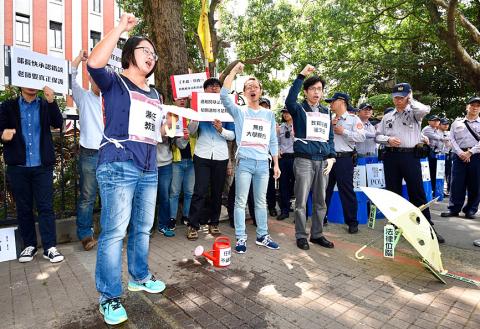A Ministry of Education draft bill for transitioning and closing private universities lacks safeguards for disposing of school property, the Taiwan Higher Education Union said yesterday, calling for the assets of dissolved schools to be placed in a public higher-education trust.
Numerous private universities are expected to merge or fold in the near future due to declining student numbers, potentially paving the way for massive layoffs of university instructors.
“The ministry is basically giving schools a blank check on how they want to transition,” union chairwoman Liu Mei-chun (劉梅君) said, blasting a ministry proposal to set aside NT$5 billion (US$165 million) in special subsidies for “transitioning” schools, while failing to earmark funds for severance pay.

Photo: Peter Lo, Taipei Times
“After the money is given to schools, it will just disappear, and teachers will only be able to get a hold of their share after long and arduous lawsuits,” she said.
“The Ministry of Education is not willing to shoulder its responsibility to take over the management of struggling schools,” said Su Tzu-hsuan (蘇子軒), the union’s student action committee convener, questioning a ministry proposal to provide “guidance” to schools that fall behind in paying salaries, rather than filing court motions to replace their boards and take direct control.
“The ‘professional guidance’ proposal is a feint because only schools’ founding capital and physical property would be put in trust during the guidance period,” he said, citing bank accounts, special funds and investments of subsidiary organizations as examples of resources over which struggling school boards would retain direct control.
Rights campaigners have expressed concern that school boards might choose to divert school resources rather than pay teachers’ benefits, with Alliance Against the Commercialization of Education member Hsieh Yi-hung (謝毅弘) saying that a survey by his group had found that the nation’s 107 private universities have NT$14.5 billion in bank funds alone.
Su also criticized the ministry’s removal of requirements that school closures be passed by an internal school advisory committee or a consensus after talks with teacher and student representatives.
While there are provisions requiring severance payments for laid-off teachers, there are no rules on how these should be paid out, effectively allowing schools to set the terms, he said.
Union executive secretary Chen Chiung-ting (陳炯廷) called for the property and capital of closed schools to be placed in a public fund, which can be used for improving student-teacher ratios, lowering tuition in the remaining schools and other objectives.

ANOTHER EMERGES: The CWA yesterday said this year’s fourth storm of the typhoon season had formed in the South China Sea, but was not expected to affect Taiwan Tropical Storm Gaemi has intensified slightly as it heads toward Taiwan, where it is expected to affect the country in the coming days, the Central Weather Administration (CWA) said yesterday. As of 8am yesterday, the 120km-radius storm was 800km southeast of Oluanpi (鵝鑾鼻), Taiwan’s southernmost tip, moving at 9kph northwest, the agency said. A sea warning for Gaemi could be issued tonight at the earliest, it said, adding that the storm is projected to be closest to Taiwan on Wednesday or Thursday. Gaemi’s potential effect on Taiwan remains unclear, as that would depend on its direction, radius and intensity, forecasters said. Former Weather Forecast

As COVID-19 cases in Japan have been increasing for 10 consecutive weeks, people should get vaccinated before visiting the nation, the Centers for Disease Control (CDC) said. The centers reported 773 hospitalizations and 124 deaths related to COVID-19 in Taiwan last week. CDC Epidemic Intelligence Center Director Guo Hung-wei (郭宏偉) on Tuesday said the number of weekly COVID-19 cases reported in Japan has been increasing since mid-May and surpassed 55,000 cases from July 8 to July 14. The average number of COVID-19 patients at Japan’s healthcare facilities that week was also 1.39 times that of the week before and KP.3 is the dominant

The Chinese Communist Party’s (CCP) working group for Taiwan-related policies is likely to be upgraded to a committee-level body, a report commissioned by the Mainland Affairs Council (MAC) said. As Chinese President Xi Jinping (習近平) is increasingly likely to upgrade the CCP’s Central Leading Group for Taiwan Affairs, Taiwanese authorities should prepare by researching Xi and the CCP, the report said. At the third plenary session of the 20th Central Committee of the CCP, which ended on Thursday last week, the party set a target of 2029 for the completion of some tasks, meaning that Xi is likely preparing to

US-CHINA TRADE DISPUTE: Despite Beijing’s offer of preferential treatment, the lure of China has dimmed as Taiwanese and international investors move out Japan and the US have become the favored destinations for Taiwanese graduates as China’s attraction has waned over the years, the Ministry of Labor said. According to the ministry’s latest income and employment advisory published this month, 3,215 Taiwanese university graduates from the class of 2020 went to Japan, surpassing for the first time the 2,881 graduates who went to China. A total of 2,300 graduates from the class of 2021 went to the US, compared with the 2,262 who went to China, the document showed. The trend continued for the class of 2023, of whom 1,460 went to Japan, 1,334 went to